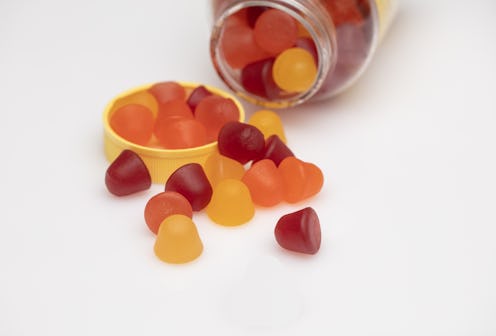Wellness
Are Apple Cider Vinegar Gummies Effective? Here's What Experts Say
And how they compare to their liquid counterpart.

Perhaps you’ve heard of apple cider vinegar for its healing powers, tackling everything from digestive to skin health. It can taste strong, though — so, if your tastebuds aren’t up for taking a straight shot of the acidic liquid, you can get a tastier dose of the supplement in a gummy format. But do apple cider vinegar gummies work as well as their liquid or pill counterparts?
Apple cider vinegar (also known as ACV) is produced by fermenting apples to produce acetic acid, one of the main ingredients of vinegar, says Dawn Jarvis, RD, LDN, licensed dietitian nutritionist at Garden of Life supplement company. It’s been a culinary and medicinal supplement for centuries, used for everything from cleaning wounds to treating stomach aches. And ACV is just as popular these days: You can drink it straight or opt to take it in pill or — most recently — gummy form, and pure ACV is widely considered safe to use when taken in the right dose.
Since gummies are the latest form of ACV on the shelves, Bustle reached out to nutrition experts for the 411 on whether apple cider vinegar gummies are effective.
Benefits of ACV
One of ACV’s most common uses is for easing digestive woes, says Mia Syn, RDN, registered dietitian nutritionist at Goli Nutrition supplement company. Since ACV is acidic, it could help support digestion in people with low levels of stomach acid, says Jarvis. It’s also naturally antimicrobial, which could help get rid of excess bacteria in your digestive tract that causes uncomfortable symptoms like gas and bloating.
Vinegar (including ACV) can also help keep your blood sugar in check by improving insulin function, says Jarvis. And research suggests that taking vinegar regularly could help lower cholesterol and regulate triglyceride levels, both of which are important for preventing cardiovascular problems like heart attacks and stroke. The ingredient’s antibacterial properties might also be good for your skin, according to Jarvis. The acetic acid has bacteria-fighting abilities that can combat acne and restore your skin’s pH balance, though there’s little research to show if taking ACV in gummy form versus using it topically produces different skin-related effects.
Do Apple Cider Vinegar Gummies Work?
The jury’s still out on whether taking ACV in gummy form is as effective as the liquid itself. But the short answer is: It depends. ACV can provide multiple health benefits, but gummies may contain additional ingredients or various levels of acetic acid, which can produce different effects than liquid ACV alone. Gummies are also not regulated by the FDA, so doses and contents can differ from supplement to supplement and may contain extra ingredients like vitamins or probiotics that you may or may not be looking for.
Taking too much ACV can lead to an stomach upset, so stick to the serving size recommended on your supplement of choice since different gummies can contain different amounts of acetic acid. Syn recommends consulting with your doctor to build an ACV regimen that works best for you, especially if you have a preexisting condition like a gastrointestinal disorder or diabetes.
But if stomaching the taste of liquid ACV is out of the question or you’re looking to consume the healing ingredient with a side of additional vitamins or supplements, check in with your doctor to find a gummy alternative that suits your needs.
Studies referenced:
Bjarnsholt, T. (2015). Antibiofilm Properties of Acetic Acid. Advances in Wound Care, https://www.ncbi.nlm.nih.gov/pmc/articles/PMC4486441/
Brighenti, F. (1995). Effect of neutralized and native vinegar on blood glucose and acetate responses to a mixed meal in healthy subjects. European Journal of Clinical Nutrition, https://pubmed.ncbi.nlm.nih.gov/7796781/
Fushimi, T. (2006). Dietary acetic acid reduces serum cholesterol and triacylglycerols in rats fed a cholesterol-rich diet. British Journal of Nutrition, https://pubmed.ncbi.nlm.nih.gov/16611381/
Johnston, C. (2006). Vinegar: Medicinal Uses and Antiglycemic Effect. Medscape General Medicine, https://www.ncbi.nlm.nih.gov/pmc/articles/PMC1785201/
Kondo, T. (2009). Vinegar intake reduces body weight, body fat mass, and serum triglyceride levels in obese Japanese subjects. Bioscience, Biotechnology, and Biochemistry, https://pubmed.ncbi.nlm.nih.gov/19661687/
Shishehbor, F. (2017). Vinegar consumption can attenuate postprandial glucose and insulin responses; a systematic review and meta-analysis of clinical trials. Diabetes Research and Clinical Practice, https://pubmed.ncbi.nlm.nih.gov/28292654/
Yagnik, D. (2018). Antimicrobial activity of apple cider vinegar against Escherichia coli, Staphylococcus aureus and Candida albicans; downregulating cytokine and microbial protein expression. Scientific Reports, https://pubmed.ncbi.nlm.nih.gov/29379012/
Experts:
Dawn Jarvis, RD, MS, LDN, licensed dietitian nutritionist at Garden of Life supplement company
Mia Syn, MS, RD, registered dietitian nutritionist at Goli Nutrition supplement company
This article was originally published on